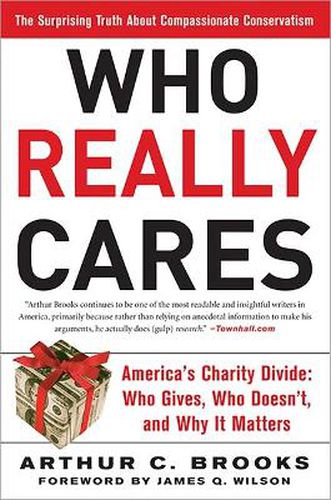Readings Newsletter
Become a Readings Member to make your shopping experience even easier.
Sign in or sign up for free!
You’re not far away from qualifying for FREE standard shipping within Australia
You’ve qualified for FREE standard shipping within Australia
The cart is loading…






In this surprising book, a leading authority on the economics of philanthropy reveals that conservatives are actually far more compassionate than their liberal foes. Recent disasters such as the Thailand tsunami and the Pakistan earthquake have highlighted the importance of charity, yet how many of us really do give? In Who Really Cares , we learn that charity represents a major cultural fault line. In America, approximately three quarters of the population give their time and money to various charities, churches and causes; this is the same group that shares money with relatives and friends, donates blood and gives in other informal ways. The other quarter of the population does virtually none of these things. Author Arthur Brooks asks why some people are charitable, while others are not. Using the best and most comprehensive data sources available on charitable behaviour, he uncovers four powerful forces that are responsible determining our attitudes, and turning us into either givers or non-givers - religious beliefs; attitudes towards the government’s role in economic life; whether our income is earned or not; and the strength of our families. This book argues that charity really matters. More than just a pleasant personal characteristic, it is a key element in our prosperity, happiness, health and even our ability to govern ourselves as a free people. Brooks shows how the forces compromising the willingness and ability of certain people to act charitably lead to marginalized communities of non-givers, polarized politics and a weakened economy. And he also suggests ways that individuals, organizations and governments can expand the ranks of givers for the good of us all.
$9.00 standard shipping within Australia
FREE standard shipping within Australia for orders over $100.00
Express & International shipping calculated at checkout
In this surprising book, a leading authority on the economics of philanthropy reveals that conservatives are actually far more compassionate than their liberal foes. Recent disasters such as the Thailand tsunami and the Pakistan earthquake have highlighted the importance of charity, yet how many of us really do give? In Who Really Cares , we learn that charity represents a major cultural fault line. In America, approximately three quarters of the population give their time and money to various charities, churches and causes; this is the same group that shares money with relatives and friends, donates blood and gives in other informal ways. The other quarter of the population does virtually none of these things. Author Arthur Brooks asks why some people are charitable, while others are not. Using the best and most comprehensive data sources available on charitable behaviour, he uncovers four powerful forces that are responsible determining our attitudes, and turning us into either givers or non-givers - religious beliefs; attitudes towards the government’s role in economic life; whether our income is earned or not; and the strength of our families. This book argues that charity really matters. More than just a pleasant personal characteristic, it is a key element in our prosperity, happiness, health and even our ability to govern ourselves as a free people. Brooks shows how the forces compromising the willingness and ability of certain people to act charitably lead to marginalized communities of non-givers, polarized politics and a weakened economy. And he also suggests ways that individuals, organizations and governments can expand the ranks of givers for the good of us all.